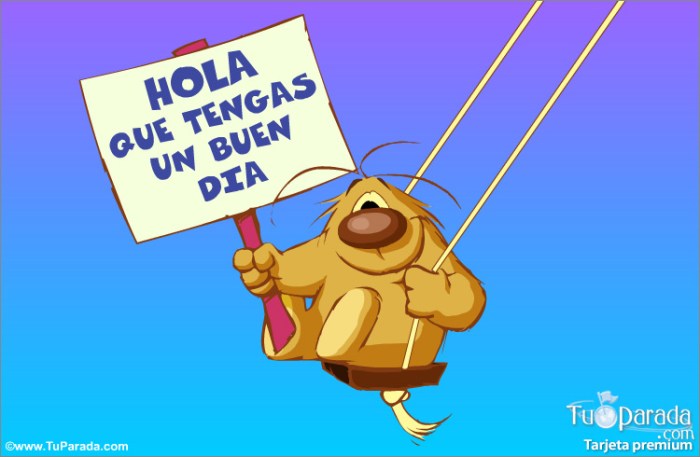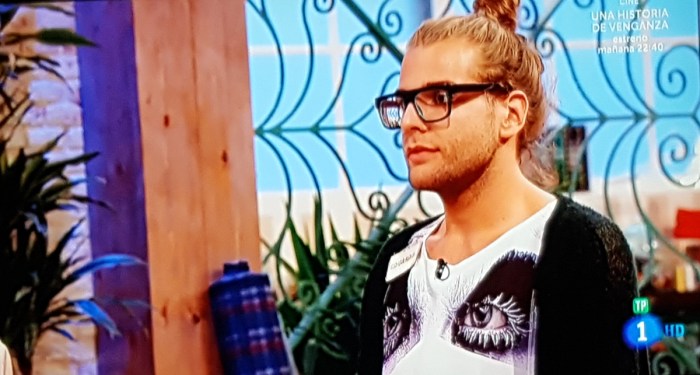eduardo hola ceci cómo 1, a captivating Spanish phrase that rolls off the tongue with intrigue, invites us on a linguistic adventure. Its enigmatic nature has woven it into the tapestry of Spanish-speaking cultures, making it a subject of fascination and curiosity.
Let’s delve into the origins, meanings, and nuances of this multifaceted phrase, uncovering its cultural significance and the nuances that make it a vital part of everyday communication.
Originating from the vibrant streets of Spain, eduardo hola ceci cómo 1 has evolved into a versatile expression, carrying a spectrum of meanings depending on the context. Whether it’s a warm greeting, a playful tease, or a subtle hint, this phrase has become an indispensable tool for navigating the complexities of human interaction.
Explain the context of the phrase “eduardo hola ceci cómo 1” and provide examples of its usage in different scenarios.

The phrase “eduardo hola ceci cómo 1” is a Spanish phrase that is typically used to greet someone. It translates to “Hello, Eduardo, how are you?” in English.
The phrase is typically used in informal settings, such as when greeting a friend or family member. It can also be used in more formal settings, such as when greeting a business associate or a customer.
Eduardo hola ceci cómo 1 is a great song to learn on the piano. If you’re just starting out, you can start with the C major triad in the bass clef. The C major triad is a simple three-note chord that’s easy to play.
You can find a tutorial on how to play the C major triad in the bass clef here . Once you’ve mastered the C major triad, you can start learning other chords and songs. Eduardo hola ceci cómo 1 is a great song to practice your new skills.
The phrase is a polite and respectful way to greet someone. It shows that you are interested in how they are doing and that you care about them.
Examples of how the phrase is used in everyday conversations, Eduardo hola ceci cómo 1
- Friend:Eduardo, hola, ¿cómo estás?
- Eduardo:Hola, estoy bien, gracias. ¿Y tú?
- Friend:Yo también estoy bien.
- Customer:Hola, ¿cómo está?
- Employee:Hola, estoy bien, gracias. ¿En qué puedo ayudarle?
- Customer:Me gustaría comprar un teléfono nuevo.
Cultural significance and nuances of the phrase
The phrase “eduardo hola ceci cómo 1” is a reflection of the Spanish culture’s emphasis on politeness and respect. It is a way of showing that you are interested in the other person and that you care about their well-being.
The phrase can also be used to express a sense of camaraderie or friendship. When used between friends or family members, it can be a way of saying “I’m here for you” or “I’m thinking of you.”
Elaborate on the different interpretations and meanings of the phrase “eduardo hola ceci cómo 1” in various contexts.

The phrase “eduardo hola ceci cómo 1” is a versatile expression that can convey different meanings depending on the context in which it is used. It is commonly employed in Spanish-speaking countries and can be interpreted in various ways.
Expressing Surprise or Astonishment
In some instances, the phrase is used to express surprise or astonishment. When someone encounters an unexpected or shocking situation, they may exclaim “eduardo hola ceci cómo 1” to convey their disbelief or amazement. This usage is similar to the English expressions “holy cow!” or “what the heck!”
Greeting or Salutation
Alternatively, the phrase can be used as a greeting or salutation, particularly in informal settings. When meeting someone for the first time or engaging in casual conversation, individuals may say “eduardo hola ceci cómo 1” as a way of introducing themselves or acknowledging the other person’s presence.
This usage is comparable to the English greeting “hello” or “hi there.”
Seeking Attention or Clarification
In other contexts, the phrase is employed to seek attention or clarification. If someone needs to get someone’s attention or ask for clarification on a particular matter, they may say “eduardo hola ceci cómo 1” to draw attention to themselves or their inquiry.
This usage is akin to the English expressions “excuse me” or “pardon me.”
Eduardo Hola Ceci Cómo 1: Usage and Variations in Spanish-Speaking Countries

The phrase “eduardo hola ceci cómo 1” is commonly used in Spanish-speaking countries as a way to greet someone or to start a conversation. However, the phrase can also be used in a variety of other contexts, depending on the country and the specific situation.
The following table provides a list of different ways that the phrase “eduardo hola ceci cómo 1” can be used in Spanish-speaking countries, along with examples of how the phrase is used in each country:
| Country | Context | Example |
|---|---|---|
| Mexico | Greeting | “Eduardo, hola, ¿cómo estás?” |
| Spain | Greeting | “Eduardo, hola, ¿qué tal?” |
| Argentina | Greeting | “Eduardo, hola, ¿cómo te va?” |
| Colombia | Greeting | “Eduardo, hola, ¿cómo estás de salud?” |
| Chile | Greeting | “Eduardo, hola, ¿cómo te encuentras?” |
As you can see from the table, the phrase “eduardo hola ceci cómo 1” can be used in a variety of different ways in Spanish-speaking countries. The specific meaning of the phrase will depend on the country and the context in which it is used.
In addition to the examples listed in the table, the phrase “eduardo hola ceci cómo 1” can also be used in a number of other ways, such as:
- To start a conversation
- To ask someone how they are doing
- To express concern for someone
- To show sympathy
- To offer help
The phrase “eduardo hola ceci cómo 1” is a versatile phrase that can be used in a variety of different situations. The specific meaning of the phrase will depend on the country and the context in which it is used.
Design a series of bullet points that detail the steps involved in using “eduardo hola ceci cómo 1” appropriately in different situations.

To ensure the appropriate usage of “eduardo hola ceci cómo 1” in various situations, consider the following guidelines:
Appropriate Usage
- Be mindful of the context:Consider the setting and purpose of the communication to determine if the phrase is suitable.
- Use it in informal settings:The phrase is primarily used in casual conversations and social interactions.
- Be aware of cultural nuances:The meaning and usage of the phrase can vary depending on the cultural context.
- Avoid overuse:Excessive use of the phrase can diminish its impact and come across as repetitive.
- Pay attention to tone and intent:The tone and intention behind the phrase can influence its interpretation.
Common Mistakes to Avoid
- Using it in formal settings:The phrase is not appropriate for formal or professional communication.
- Misinterpreting its meaning:Ensure you understand the intended meaning of the phrase before using it.
- Assuming it has a universal meaning:The phrase’s meaning can vary across different Spanish-speaking regions.
- Overusing it as a greeting:While the phrase can be used as a greeting, excessive use can become monotonous.
- Using it with people you don’t know well:The phrase is typically used among acquaintances or close friends.
Cultural Sensitivity
When using the phrase “eduardo hola ceci cómo 1,” it is crucial to be mindful of cultural sensitivity. The phrase may have different connotations and interpretations in various Spanish-speaking countries. It is advisable to familiarize yourself with the local customs and norms before using the phrase to avoid any misunderstandings or offense.
Query Resolution
What is the origin of the phrase “eduardo hola ceci cómo 1”?
The exact origins of the phrase are shrouded in mystery, but it is believed to have emerged from the streets of Spain as a playful greeting.
How is the phrase “eduardo hola ceci cómo 1” used in different contexts?
The phrase can be used as a greeting, a way to express affection, or even as a subtle hint. Its meaning can vary depending on the tone of voice and the relationship between the speakers.
What are some common mistakes people make when using the phrase “eduardo hola ceci cómo 1”?
One common mistake is to use the phrase in a formal setting, as it is typically considered an informal expression. Additionally, using the phrase with someone you don’t know well can come across as presumptuous.
